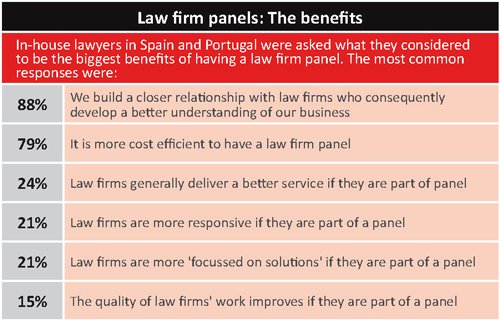New thinking required

 Many clients’ approach to selecting law firm panels could be fundamentally flawed and result in them receiving a poorer service from firms that are difficult to replace
Many clients’ approach to selecting law firm panels could be fundamentally flawed and result in them receiving a poorer service from firms that are difficult to replace
Clients in Spain are increasingly adopting more formal approaches to selecting preferred law firms, and this includes the greater use of law firm panels. It’s a trend that is causing controversy. A number of partners at Magic Circle firms in Madrid, for example, have highlighted the fact that a growing number of banks and financial institutions are introducing much tougher law firm selection processes, which sometimes includes the creation of law firm panels. The partners claim that this is merely an excuse to drive down the fees they pay for their legal advisers. They also argue that this trend means legal service providers are increasingly selected on the basis of price, rather than quality, and consequently clients will receiver poorer advice.
However, the fact is that a growing number of clients see significant advantages in having a small panel of preferred providers. They argue that the benefits include the fostering of closer relationships with external legal advisers with the result that they develop a better understanding of the clients’ business. Clients also believe that having a law firm panel is, ultimately, more cost efficient.
This all sounds good in theory, but according to new research by Iberian Lawyer, clients are now waking up to some of the pitfalls to avoid when creating a law firm panel. As many as 71 per cent of general counsel in Spain and Portugal believe that one of the risks associated with having a law firm panel is that the firms on the panel “can become too complacent, take your work for granted, and their performance can suffer”. Meanwhile, 59 per cent warned that, having a panel of law firms can result in the client becoming “too reliant on the panel firms and this makes it more difficult to New thinking required replace them if their performance is unsatisfactory”.
The widespread nature of these concerns supports the view that clients’ traditional way of creating law firm panels is fundamentally flawed. Peter Cornell, former global managing partner at Clifford Chance and former head of the firm’s Madrid office, says: “Clients are finding they need to get the balance right between developing a closer relationship with a few firms or working with a wider pool.” Cornell is a founding partner of Metric Capital, which has recently made a number of recent Spanish acquisitions, and chairman of law firm advisers Lexington Consultants. “In my work in private equity, we need the flexibility to work with the right local firm for any specific deal,” Cornell adds.
C ornell argues that clients’ methods of selecting law firm panels are often so fundamentally flawed that they are bound to fail and that clients that do decide to have a panel, often do not see any improvement in the performance of their external legal advisers.
ornell argues that clients’ methods of selecting law firm panels are often so fundamentally flawed that they are bound to fail and that clients that do decide to have a panel, often do not see any improvement in the performance of their external legal advisers.
Some experts experienced in creating law firm panels also argue that some clients opt to have a panel because they want to reduce the number of law firms they use. However, this type of thinking can create problems. When a client uses fewer firms, it tends to select larger law firms for its panel as they are likely to cover a wider range of practice areas. However, choosing larger law firms may not be the most efficient strategy as they may also be the most expensive and least responsive firms. In Cornell’s view, clients need to ensure there is the “right mix” in their panels in the sense that there are both larger and smaller firms as well as firms charging different levels of fees, as this can be “an effective check on less efficient firms”.
In addition, it is argued that clients’ panels should include two law firms for each practice area as this creates competition and avoids situations where law firms become complacent. Another mistake clients often make, according to specialist general counsel consultancy AdvanceLaw, is that when reviewing their law firm panels they merely “rubber stamp incumbents (which can confer a sense of entitlement), rather than including promising new firms”.
So taking this as a benchmark, are there any ways in which clients in Spain and Portugal could improve the way they develop their law firm panels? There is a clear indication that in-house lawyers in Iberia do not, in general, have “diversity” in their panels; that is, a mix of larger and smaller firms, a mix of firms that charge higher and lower fees, or at least two firms for every practice area.
The majority of general counsel who participated in the Iberian Lawyer research said that the number of firms included on their organisation’s panel was low, specifically five or less. Only 5 per cent of respondents said they included more than 20 firms on their panel. Around a third (29 per cent) said they had six to ten firms on their panel. A total of 14 per cent said they had 11 to 15 law firms on their panel. Meanwhile, the majority of in-house lawyers (52 per cent) said they did not have at least two firms for every practice area.
Not replacing poor performers
The fact that many clients in Spain and Portugal have developed small, and often unbalanced, law firm panels could have several negative consequences for their business. To begin with, they could be too reliant on the small number of firms they use and consequently, they may find it difficult to replace any of the firms that are performing poorly. Meanwhile, firms on the panel, facing little competition, could be taking the work they receive for granted and therefore be putting little effort into ensuring the best customer service for clients. Around one in three in-house lawyers in Spain and Portugal (38 per cent) acknowledged that it is “not necessarily more cost effective to have a law firm panel”, while 32 per cent said the creation of panels can mean “greater use of full-service firms, which tend to be more expensive”.
Meanwhile, it seems that, when reviewing their panels, a sizeable proportion of clients do not change any of the law firms they are using. One in three in-house lawyers in Spain and Portugal (32 per cent) said that when they reviewed their panel they “usually keep the same firms without adding any new firms”. Such a strategy could potentially lead to a sense of entitlement among the firms on the panel and result in them doing little to improve the service they provide.
If clients want to maximise the value of law firm panels, it’s vital that they rethink their approach to how they design and manage them. In general, it’s a good idea to increase the number of law firms on the panel, ideally so that there are at least two firms that cover each practice area. This creates competition, reduces complacency and ensures that firms put maximum effort into ensuring the service offered to the client is of the highest quality. Similarly, it pays to change at least some of the firms when conducting a panel review; it’s not beneficial to have your external legal advisers taking you for granted and they are more likely to provide a better service if they know there is the possibility they will lose your business if they are underperforming.












